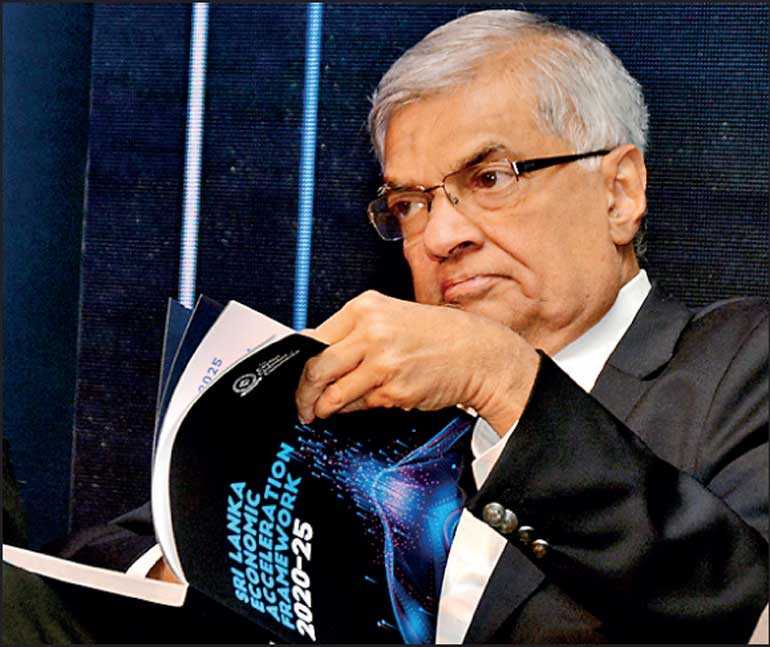Monday Feb 23, 2026
Monday Feb 23, 2026
Wednesday, 18 September 2019 00:00 - - {{hitsCtrl.values.hits}}

By Uditha Jayasinghe
and Charumini de Silva
Prime Minister Ranil Wickremesinghe yesterday said that for Sri Lanka to see exponential growth, it has to make a clean break from the inward-looking policies of the past, recalibrate and move towards increased productivity and competitiveness, underpinned by a new system of governance.
Speaking as the Chief Guest at the Sri Lanka Economic Summit 2019, titled “Re-calibrating Sri Lanka’s Economic Trajectory: Towards 2025,” organised by the Ceylon Chamber of Commerce (CCC), Wickremesinghe recapped the legislative changes achieved by the Government, as well as the fiscal consolidation program followed in the past few years. Kicking off his address, the Prime Minister quipped that he was touched to be invited to speak to the gathering, given that he has been routinely blamed for the problems of the private sector in the past, including high interest rates, which he said he was happy to absorb on behalf of the Central Bank.
“We have two options: we can either stagnate as a middle-income country, which many countries do when they become a middle-income country, or we can continue to grow.
Do you want to stagnate in a middle-income trap, or do you want to have a leapfrog trajectory, which will make us an advanced economy? Then let’s prepare the country,” Wickremesinghe said.
However, Wickremesinghe was adamant that for the Sri Lankan economy to experience a true take-off, there will need to be sweeping changes on multiple levels, including policies, stronger competitiveness, breaking into new industries, international engagement, and maintaining macroeconomic fundamentals.
“If we are taking a leapfrog trajectory, we have to do things differently. So we have to make a clean break. We must have a fiscal policy that contains debt, we should not allow it to increase. There should be a much larger space for investors. Our business climate has to improve, and we must have reforms to boost private investment productivity. These are things we must do.”
Wickremesinghe emphasised that trade deals were an essential component of strong growth, even proposing to move beyond the negotiations currently ongoing with India, Thailand, and China. He pointed out that stronger trade with East Asian economies such as Indonesia and Malaysia was positive, as Sri Lanka could benefit from their growth.
“That’s where the money is, we have to go there. If we are going to be an advanced economy, then we must be a highly competitive economy. We have to join the global value chains, that’s what we have to do. There is no other way. But you are worried about how you will be affected, how we are going to compete. No, our commitment is to promote trade adjustment packages, so that you can upgrade or expand your venture.”
“We have to keep increasing our productiveness and competitiveness, we have to keep going up. These are the ways to become an advanced economy, and we need to change our governmental system, which is currently designed for a low-income economy,” he added.
Advocating “radical restructuring”, the Prime Minister acknowledged that deep changes in State Owned Enterprises (SOEs) are needed, along with stronger investment in skills development, healthcare and technology development. He also said that the Government has focused on infrastructure development, particularly in rural areas, and pushed investment into underserved areas such as schools and community-based projects. Revamping government systems, such as having a single window for investment or exports was also important, he noted.
“Now we have got to face the target of becoming an advanced economy, and we have to have a delivery-oriented public sector in key areas. We need competent faces, we have to rebuild trust and that’s the way to go forward.”